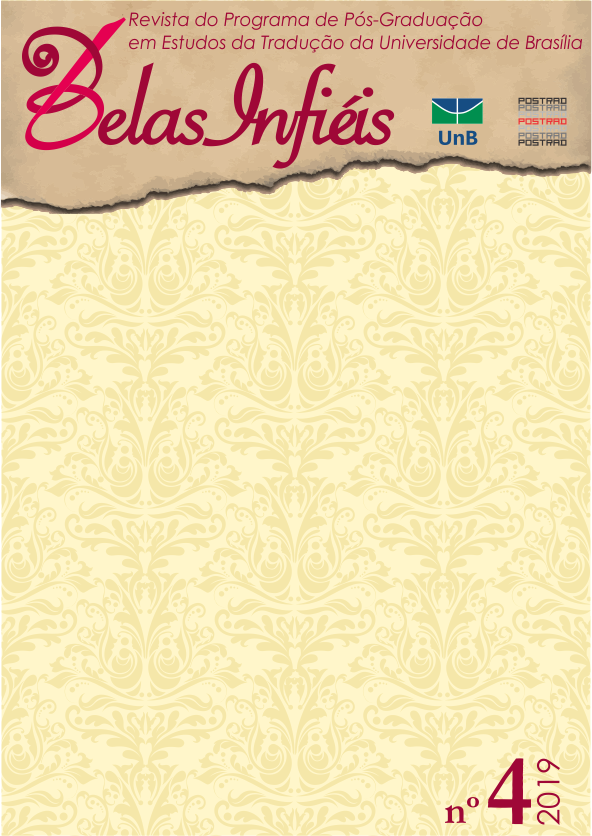A noção de problema nos Estudos da Tradução: um novo olhar teórico com exemplos do par linguístico espanhol/português
DOI :
https://doi.org/10.26512/belasinfieis.v8.n4.2019.23024Mots-clés :
Tradução. Espanhol. Português. Terminologia. Problema.Résumé
Este trabalho deriva da proposta de tradução do espanhol para o português de uma das obras mais fundamentais da área dos Estudos da Tradução, Traducción y Traductología: Introducción a la Traductología (2013), da tradutora, professora e autora espanhola Amparo Hurtado Albir, que retoma as principais definições, características e as noções de análise da tradução a partir dos mais diferentes teóricos e de suas perspectivas. Segundo Franco (2010), essa é a 21ª obra mais citada nos estudos sobre a tradução, sendo a única publicação editada no século XXI e, além disso, a única em língua espanhola entre as cinquenta mais referenciadas. A partir dessa tradução, e prevendo a complexidade do processo tradutório a ser enfrentado, propôs-se uma análise teórica e empírica sobre uma das noções mais centrais e, ao mesmo tempo, menos refletidas nos Estudos da Tradução, a de problema. Para isso, revisitou-se a noção de problema de modo geral, recorrendo a discussões matemático-filosóficas, que têm sua origem em Platão e que se desenvolveram com o aporte de filósofos contemporâneos, como Henri Bergson e Gilles Deleuze. Além disso, apesar da carência de estudos, também foi realizada uma pesquisa bibliográfica na literatura da área da tradução por meio da retomada de três teóricos que se dedicaram ao estudo dessa noção ”” Mounin (1963), Lörsher (1991), Nord (1997) e o Grupo PACTE e Hurtado Albir (2011; 2013) ””, analisando suas reflexões e as categorizações propostas por esses autores. A partir de um estudo exploratório em que se realizou a tradução do primeiro capítulo de Traducción y Traductología, foram identificados, compilados e analisados quantitativa e qualitativamente os problemas encontrados, constatando a frequência expressiva de problemas terminológicos. Com base nisso, propôs-se uma nova classificação de problemas de tradução, incluindo essa categoria específica. Como conclusão de destaque desta pesquisa, está a proposta de uma concepção sobre a noção de problema que o entenda de modo positivo, como propositor de novos conhecimentos e perspectivas para as mais diversas áreas do saber.
Téléchargements
Références
BERGSON, Henri. OEuvres. Paris : PUF, 1959.
DELEUZE, Gilles. Bergsonismo. Traduzido por: Luiz B. L. Orlandi. São Paulo: Editora 34, 2012.
DELEUZE, Gilles. Le Bergsonisme. Paris: PUF, 1966.
ECO, Umberto. Quase a mesma coisa: experiências de tradução. São Paulo: Record, 2007.
FRANCO, Javier. Who’s who and what’s what in Translation Studies: a preliminary approach. In: FRANCO, Javier. Tracks and Treks in Translation Studies, Amsterdam: John Benjamins Publishing Company, 2010. p. 7-28.
HURTADO ALBIR, Amparo. Traducción y traductología: introducción a la traductología. Madrid: Ediciones Cátedra, 2013.
LÖRSCHER, Wolfgang. Translation performance, translation process and translation strategies. Tübingen: Gunter Narr Verlang, 1991.
MOUNIN, Georges. Les Problèmes théoriques de la traduction. Paris: Gallimard, 1963.
NORD, Christiane. Translating as a Purposeful Activity. In: NORD, Christiane. Functionalist Approaches Explained. Manchester: St. Jerome, 1997.
PACTE. (BEEBY, A.; FERNÁNDEZ, M.; FOX, O.; HURTADO ALBIR, A.; KUZNIK, A.; NEUNZIG, W.; RODRÃGUEZ-INÉS, P.; ROMERO, L.; WIMMER, S. Investigadora principal: HURTADO ALBIR, A.). Results of the Validation of the PACTE Translation Competence Model: Translation Problems and Translation Competence. In: ALVSTADA, Cecilia; HILD, Adelina; TISELIUS, Elisabet (Ed.) Methods and Strategies of Process Research: Integrative Approaches in Translation Studies. Amsterdam: John Benjamins, 2011. p. 317-343.
ROQUE, Tatiana. Sobre a noção de problema. Lugar comum, n. 23-24, p. 135-146, 2008.
WAQUIL, Marina. Traduzindo Traducción y Traductología: problemas terminológicos de tradução. Tese (Doutorado em Letras) ”“ Programa de Pós-Graduação em Letras, Universidade Federal do Rio Grande do Sul, Rio Grande do Sul, 2017. Disponível em: https://lume.ufrgs.br/bitstream/handle/10183/166273/001027759.pdf?sequence=1&isAllowed=y Acesso em: 24 set. 2019.
Téléchargements
Publié-e
Comment citer
Numéro
Rubrique
Licence
Copyright Statement
Given the public access to this journal, the texts are free to use but requires the recognition of the original authorship and initial publication in this journal to be properly stated.
The journal allows the use of works published for non-commercial purposes, including the right to submit the work to publicly accessible databases. Published contributions are the sole and exclusive responsibility of the author(s).
- When submitting papers to be evaluated by the Belas Infiéis journal, the author(s):
- Declare that the contents of the contributions are original and of their original creation, being entirely responsible for their content if there is an objection by third parties.
- Claim to be aware that they should not commit academic plagiarism.
- Declare that the manuscript has not been published, completely or partially, in Portuguese or another language. If it is a translation it should be submitted to the Translated Articles section.
- Declare that the manuscript is not being evaluated by other journals.
- Declare that the manuscript was not submitted to another journal simultaneously.
- Commit(s) to inform the journal of any kind of error or inaccuracy in their contribution (published, in evaluation or in editing) and to collaborate with the editors to make due corrections of the article (when in evaluation or editing) or erratum/retraction (after publication).
- Declare that there is no conflict of interest regarding the published work.
- Authorize its release if it is accepted for publication without any kind of monetary compensation.
- Agree to assign non-exclusive rights to publication to the magazine, remaining free to make their contribution available in other media as long as the publication of the first version in Belas Infiéis magazine is mentioned. They also authorize Belas Infiéis to assign their texts for reproduction in content indexers, virtual libraries and similar platforms.
- Maintain copyright and grant the journal the right of first publication, the work being licensed under theCreative Commons Attribution License.
- Is/Are allowed and encouraged to publish and distribute their work online after the editorial process, which may increase the impact and citation of the published work.
- Authorize the editorial team to make textual adjustments and to adapt the article to the publication rules, when necessary.



















